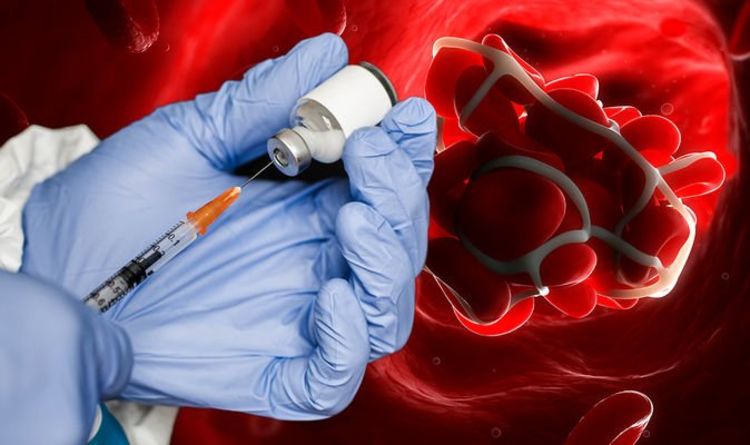
Canada announced on Tuesday that it would be halting the rollout of first doses of the AstraZeneca coronavirus vaccine due to increasing evidence of blood clots in vaccine recipients. Several countries have taken a similar policy u-turn in light of concerning reports. With millions of people across the UK expecting their second shot of the vaccine, how jittery should they be?
According to the latest figures released by Public Health England (PHE), the risk of developing a blood clot following vaccination remains infinitesimal.
Based on reports to 28 April 2021, the overall incidence following the AstraZeneca vaccine is around 10.5 per million first doses administered.
The condition is also known to occur naturally and is thought to be extremely rare.
It is also important to note that thromboses (blood clots) have been reported with natural COVID-19 infection and more than a fifth of hospitalised patients with COVID-19 have evidence of blood clots, notes the PHE.
READ MORE: Covid AstraZeneca: New evidence shows even ‘stronger’ link with brain blood clots
Does my risk of blood clots increase the second time around?
As of 28 April 2021, of the 242 suspected cases reported to the Medicines and Healthcare products Regulatory Agency (MHRA) following the AstraZeneca vaccine, only a very small number of cases have been reported after the second dose.
The Joint Committee on Vaccination and Immunisation (JCVI) – the group advising the government on the rollout – concluded that there continue to be no safety concerns following the second dose of vaccine.
Whilst currently there is no evidence to suggest whether these rare events are dose specific, it is important to note that most vaccines in the UK COVID-19 programme have been administered as first doses.
The JCVI advises that those who have received their first dose of AstraZeneca vaccine should continue to be offered the second dose unless they have developed this specific syndrome of thrombosis and thrombocytopenia following the first dose or have had an anaphylactic reaction.
DON’T MISS
High blood pressure: Best drink to lower BP [TIPS]
Fatty live disease: Three perceptible signs [INSIGHT]
Statins and alcohol: Important advice – NHS [ADVICE]
JCVI considers that there continue to be no safety concerns for this extremely rare adverse event following receipt of a second dose of AstraZeneca vaccine.
All those who have received a first dose of the AZ vaccine should continue to be offered a second dose of AZ vaccine, irrespective of age, the health body says.
The second dose will be important for longer lasting protection against COVID-19.
However, people under a certain age are being advised to seek an alternative vaccine if they haven’t already received their first shot.
In England, the COVID-19 vaccine is being offered in some hospitals and pharmacies, at local centres run by GPs and at larger vaccination centres. More centres are opening all the time.
It’s being given to:
- People aged 40 and over
- People who will turn 40 before 1 July 2021
- People at high risk from COVID-19 (clinically extremely vulnerable)
- People who live or work in care homes
- Health and social care workers
- People with a condition that puts them at higher risk (clinically vulnerable)
- People with a learning disability
- People who are a main carer for someone at high risk from COVID-19.
The order in which people will be offered the vaccine is based on advice from the JCVI.
The NHS will let you know when it’s your turn to have the COVID-19 vaccine.
Published at Wed, 12 May 2021 16:15:00 +0000
AstraZeneca vaccine: Am I more at risk of a blood clot following second jab? – JCVI advice













